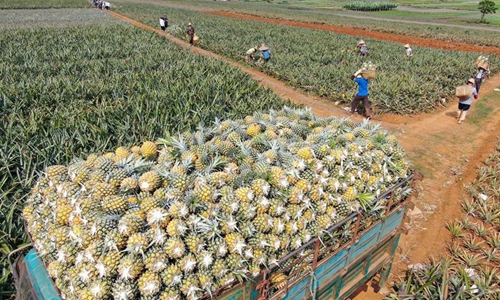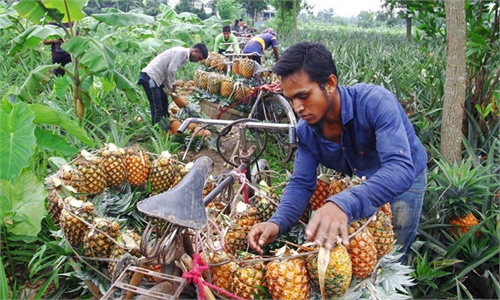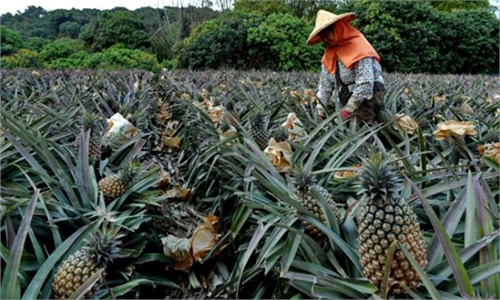Chinese mainland launches ‘pineapple express’ train ban on Taiwan fruit
Chinese mainland launches ‘pineapple express’ train after banning imports from Taiwan Island

Aerial photo taken on March 27, 2020 shows a truck loaded with pineapples at Hanzhai Village in Xuwen County of Zhanjiang City, south China's Guangdong Province. The harvest season of pineapple here is coming. (Xinhua/Deng Hua)
China has launched a pineapple themed high-speed rail line to promote pineapples produced in Xuwen, South China's Guangdong province. Local farmers already witnessed a surge of sales over the weekend, after pineapples from the island of Taiwan were banned by the Chinese mainland last Friday.
The express line links several cities across China, including Guangzhou, capital city of Guangdong, and major pineapple markets including Beijing, Shanghai and Lanzhou, capital of Northwest China's Gansu Province as part of Xuwen's marketing campaign.
Xuwen is the largest production base of pineapples in China. According to the Xinhua News Agency, the annual yield of pineapples in Xuwen accounts for 38 percent of the national output.
The customs authority on the Chinese mainland issued an import ban on pineapples from the island of Taiwan on Friday, which takes effect on Monday. The ban cited concerns about plant pests, and the authority said that it is a normal biosafety measure.
The ban triggered a sour response over the weekend from the island, whose pineapple trade with the mainland is worth up to around $50 million annually, according to media reports.
The mainland is also the largest export destination for pineapples from the island of Taiwan. In 2020, Taiwan exported 41,661 tons of fresh pineapples to the mainland, accounting for 91 percent of the island's total pineapple exports that year, according to statistics from the Council of Agriculture in Taiwan.
Pineapple farmers in the mainland are expecting a "very good year" , partly because of the ban on pineapples from Taiwan, as orders doubled over the weekend after the ban was announced on Friday, a manager surnamed Wu from a fresh produce store called Panguo Basket in Guangdong, which specializes in selling pineapples from Xuwen, told the Global Times on Sunday.
"Normally, our sales of Xuwen pineapples total less than 500 kilograms per day," Wu said. "On Saturday, the day after the ban was announced, we sold more than 1,000 kilograms."
Wu also told the Global Times that prices are above average this year, and the farmers that Panguo Basket works with are very excited about this year's income from pineapples.
A pineapple exporter in Taiwan told the Global Times in an earlier report that they are expecting "foreseeable losses" from the ban by the industry's major market, and farmers are still discussing how to cope with the losses.
Data showed that pineapples from Taiwan account for only a fraction of the mainland market, and according to data, the mainland itself produced 1.72 million tons of pineapples in 2019, 33 times more than the 51,112 tons that it imported from Taiwan that year.



